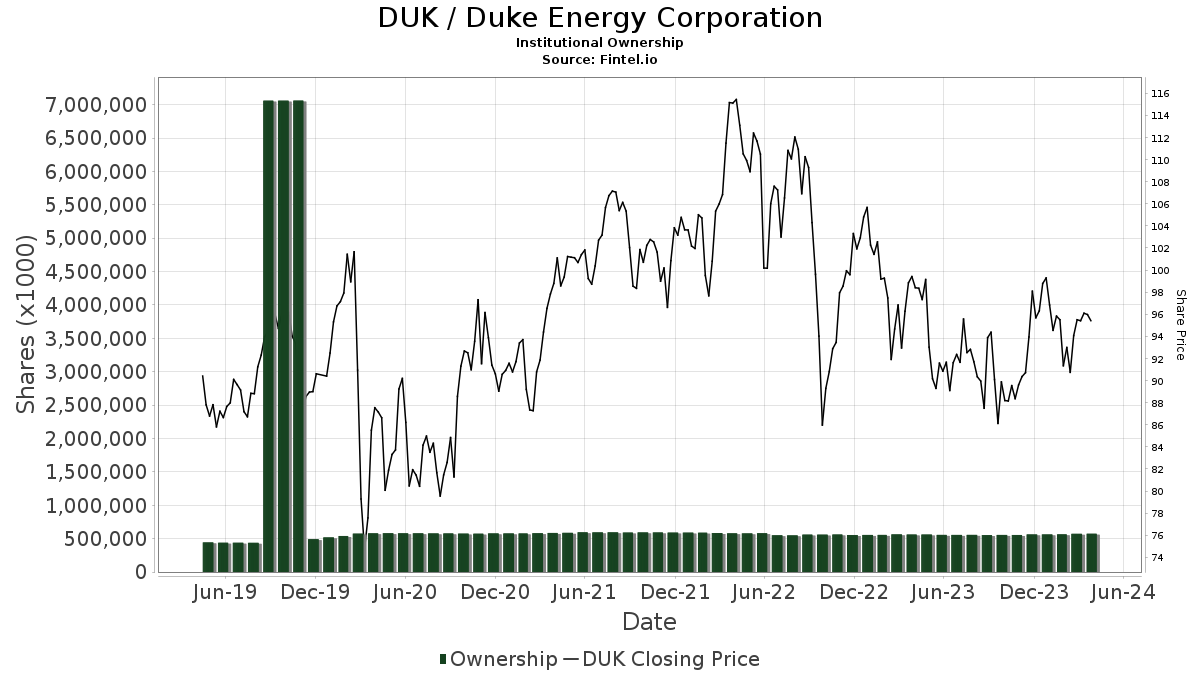Fintel reports that on August 9, 2023, BMO Capital maintained coverage of Duke Energy (NYSE:DUK) with a Outperform recommendation.
Analyst Price Forecast Suggests 15.30% Upside
As of August 2, 2023, the average one-year price target for Duke Energy is 106.23. The forecasts range from a low of 90.90 to a high of $126.00. The average price target represents an increase of 15.30% from its latest reported closing price of 92.13.
See our leaderboard of companies with the largest price target upside.
The projected annual revenue for Duke Energy is 28,035MM, a decrease of 1.97%. The projected annual non-GAAP EPS is 5.72.
Duke Energy Declares $1.02 Dividend
On July 13, 2023 the company declared a regular quarterly dividend of $1.02 per share ($4.10 annualized). Shareholders of record as of August 18, 2023 will receive the payment on September 18, 2023. Previously, the company paid $1.00 per share.
At the current share price of $92.13 / share, the stock's dividend yield is 4.45%.
Looking back five years and taking a sample every week, the average dividend yield has been 4.13%, the lowest has been 3.45%, and the highest has been 5.89%. The standard deviation of yields is 0.33 (n=235).
The current dividend yield is 0.97 standard deviations above the historical average.
Additionally, the company's dividend payout ratio is 2.31. The payout ratio tells us how much of a company's income is paid out in dividends. A payout ratio of one (1.0) means 100% of the company's income is paid in a dividend. A payout ratio greater than one means the company is dipping into savings in order to maintain its dividend - not a healthy situation. Companies with few growth prospects are expected to pay out most of their income in dividends, which typically means a payout ratio between 0.5 and 1.0. Companies with good growth prospects are expected to retain some earnings in order to invest in those growth prospects, which translates to a payout ratio of zero to 0.5.
The company's 3-Year dividend growth rate is 0.06%, demonstrating that it has increased its dividend over time.
What is the Fund Sentiment?
There are 2611 funds or institutions reporting positions in Duke Energy. This is a decrease of 46 owner(s) or 1.73% in the last quarter. Average portfolio weight of all funds dedicated to DUK is 0.39%, a decrease of 16.52%. Total shares owned by institutions decreased in the last three months by 0.95% to 556,943K shares.  The put/call ratio of DUK is 0.61, indicating a bullish outlook.
The put/call ratio of DUK is 0.61, indicating a bullish outlook.
What are Other Shareholders Doing?

Wellington Management Group Llp holds 24,056K shares representing 3.12% ownership of the company. In it's prior filing, the firm reported owning 28,194K shares, representing a decrease of 17.20%. The firm decreased its portfolio allocation in DUK by 21.01% over the last quarter.
VTSMX - Vanguard Total Stock Market Index Fund Investor Shares holds 23,847K shares representing 3.09% ownership of the company. In it's prior filing, the firm reported owning 23,403K shares, representing an increase of 1.86%. The firm decreased its portfolio allocation in DUK by 11.87% over the last quarter.
Massachusetts Financial Services holds 19,214K shares representing 2.49% ownership of the company. In it's prior filing, the firm reported owning 19,356K shares, representing a decrease of 0.74%. The firm decreased its portfolio allocation in DUK by 86.02% over the last quarter.
VFINX - Vanguard 500 Index Fund Investor Shares holds 17,967K shares representing 2.33% ownership of the company. In it's prior filing, the firm reported owning 17,802K shares, representing an increase of 0.92%. The firm decreased its portfolio allocation in DUK by 12.32% over the last quarter.
Geode Capital Management holds 14,399K shares representing 1.87% ownership of the company. In it's prior filing, the firm reported owning 14,455K shares, representing a decrease of 0.39%. The firm decreased its portfolio allocation in DUK by 13.65% over the last quarter.
Duke Energy Background Information
(This description is provided by the company.)
Duke Energy, a Fortune 150 company headquartered in Charlotte, N.C., is one of the largest energy holding companies in the U.S. It employs 30,000 people and has an electric generating capacity of 51,000 megawatts through its regulated utilities, and 3,000 megawatts through its nonregulated Duke Energy Renewables unit. Duke Energy is transforming its customers' experience, modernizing the energy grid, generating cleaner energy and expanding natural gas infrastructure to create a smarter energy future for the people and communities it serves. The Electric Utilities and Infrastructure unit's regulated utilities serve approximately 7.7 million retail electric customers in six states - North Carolina, South Carolina, Florida, Indiana, Ohio and Kentucky. The Gas Utilities and Infrastructure unit distributes natural gas to more than 1.6 million customers in five states - North Carolina, South Carolina, Tennessee, Ohio and Kentucky. The Duke Energy Renewables unit operates wind and solar generation facilities across the U.S., as well as energy storage and microgrid projects. Duke Energy was named to Fortune's 2020 'World's Most Admired Companies' list, and Forbes' 2019 'America's Best Employers' list.
Additional reading:
- DUKE ENERGY CORPORATION REPORTED TO ADJUSTED EARNINGS RECONCILIATION Three Months Ended June 30, 2023 (Dollars in millions, except per share amounts) Reported Earnings Discontinued Operations Total Adjustments Adjusted Earnings SEGMENT INCOME Electri
- // 1 // 1 Commercial Renewables: Transaction Summary Transaction Overview ▪ On June 10, 2023 Duke Energy entered into a purchase and sale agreement with Brookfield Renewable to sell the Company’s utility - scale solar and wind group for approximately
- # # #
- Form of Restricted Stock Unit Award Agreement under the Duke Energy Corporation 2023 Long-Term Incentive Plan
- Form of Performance Share Award Agreement under the Duke Energy Corporation 2023 Long-Term Incentive Plan
This story originally appeared on Fintel.
The views and opinions expressed herein are the views and opinions of the author and do not necessarily reflect those of Nasdaq, Inc.


